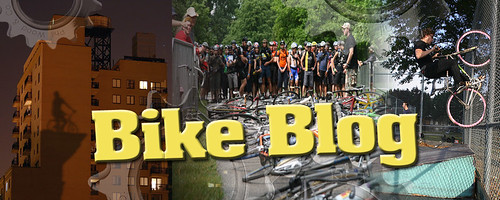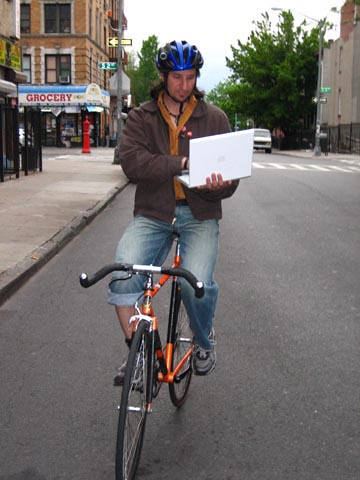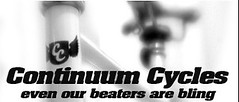February Critical Mass...can't we all just get along.
Here is a recent article from the village voice:
village voice article
Critical Impasse
With arrests growing and two cops hurt, Critical Mass gets messy
by Sarah Ferguson
February 21st, 2006 12:00 PM
It was an accident waiting to happen.
Minutes into last month's Critical Mass bike ride in Manhattan, two cops on scooter patrol collided as they moved to head off the cyclists. One officer reportedly lost control while trying to grab a biker and slammed into the scooter in front, launching that officer several feet forward and onto the pavement.
The officers were briefly hospitalized for what turned out to be minor neck and back injuries.
But the scene, with the cops being carried away on stretchers under the glare of a police chopper's spotlight and 14 riders arrested that night for various offenses, signaled a new low in the crazy, two-year war between the police and Critical Mass.
The next skirmish is set for Friday, when the monthly demonstration for cycling rights takes to the avenues again. What was once a festive, liberating event that enjoyed the tacit cooperation of New York's Finest and attracted thousands of riders—including parents with children—has devolved into an ugly cat-and-mouse chase between pissed-off cops and adrenaline-jacked activists determined to hold their ground.
The NYPD declined to comment on last month's accident or on the high-speed chases that bikers say followed in midtown. But from the bikers’ descriptions, the cops and cyclists responded with stunts worthy of The French Connection. "There were two [undercover] black SUVs gunning it on the heels of 15 or 20 riders," reports Mark Read, a 38-year-old filmmaker and adjunct professor at New York University. "We took a left just to get away and went the wrong way down a one-way street, and the SUVs followed us into oncoming traffic and drove up on the sidewalk. It was fucking berserk."
Activists say police are escalating their tactics in an effort to break the ride. "They've been playing with fire," says Ryan Kuonen, a volunteer with Time's Up, the grassroots environmental group that is being sued by the city for promoting Critical Mass.
Last week, a State Supreme Court judge declined to restrict Time's Up and others from publicizing the event and refused to grant an injunction against the rides, chiding the city for not finding a better way to work things out with the cyclists.
The city plans to appeal.
But part of the problem with the city's legal strategy is that for more than a decade, the police tolerated the rides. Things didn't get nasty until the eve of the Republican National Convention, in August 2004, when the ride swelled to 5,000 people and police claimed that "anarchists" and "extremists" had hijacked the event and were intent on "taking over the city." It didn't help that cyclists had taken over lanes on the FDR Drive and West Side Highway the month before. Since the RNC, nearly 600 Critical Mass riders have been arrested for low-level violations like blocking traffic and parading without a permit—a city statute whose constitutionality remains in dispute.
The crackdown has scared off many riders. But it has radicalized others. For them, the bike seizures, undercover surveillance, and taxpayer expense of sending an armada of police cars and helicopters to hunt them down each month are all proof of the city's disdain for bicyclists.
"We're not terrorist splinter cells. I vote Republican sometimes," says Luke Son, a Columbia student and licensed EMT who rushed to the aid of the injured scooter cops at last month's ride. "We have a right to be in the road, and if we back down now, it's like saying we're doing something wrong."
City officials say mass rides create havoc for drivers and pedestrians and need pre-approved routes to ensure public safety.
"Believe me, if you had groups of motorists gathering once a month, with advance cars sent ahead to block intersections, and the rest driving multiple cars abreast as to obstruct other traffic, often running lights in the process, then the motorists would certainly be arrested," writes the NYPD's top spokesperson, Paul J. Browne, in an e-mail to the
First Choice Movie Club
Voice.
He and other city officials complain that efforts to mediate the conflict by getting riders to agree on a route ahead of time have been rebuffed by the cyclists, who say they can't designate a route because Critical Mass has no leaders.
"The offer is now several months old, but a standing offer nonetheless: Cooperate with the police in devising and keeping to a route and we'll help make it happen," Browne says.
Bikers maintain that they are traffic and don't need a permit, and that having a fixed route would ruin the event's spontaneity. They say the few times they've tried to keep to a route, the cops corralled people anyway. At the July 2005 ride, volunteers from Time's Up passed out flyers urging bikers to follow all traffic rules, including stopping at red lights. "The people who stopped at red lights got arrested," says Time's Up founder Bill DiPaola. "It just made it easier to catch them."
And so the impasse continues.
In theory, the aim of Critical Mass is to create safer cycling conditions in the city. Yet activists complain the police crackdown is demonizing bikers and creating more hostility from drivers on the road. So what's the point?
"It's smashmouth football," complains Harris Silver, founder of City Streets, which advocates for pedestrians' rights. "You're putting people in a situation right now that's basically a street fight. It makes cyclists look like angry radicals as opposed to people who ride bikes and think there should be less cars."
Yet in Brooklyn, a permitless Critical Mass ride sets off from Grand Army Plaza the second Friday of every month without all the drama. Instead of making arrests, police facilitate the ride by blocking intersections so it can pass more swiftly. City attorney Robin Binder explains that the NYPD handles the Brooklyn ride differently because it's smaller and takes place over streets that aren't as busy. But it's also because the riders in Brooklyn have established a dialogue with police.
There's no set route, but they might tell cops where the after-party is, to give them a sense of where the ride will end up.
"They're very cool," says Kuonen says of the Brooklyn police. "The white shirt walks around at Grand Army Plaza and calms everybody's fears about being arrested, and tells you at most you'll be given a ticket if you run lights or violate traffic rules."
Kuonen and others can't understand why that approach wouldn't work in Manhattan—as it does in the nearly 400 cities around the world where Critical Mass also takes place. In Portland and San Francisco, monthly clashes between police and cyclists have given way to accommodation and greater recognition of cyclists' right to be on the road. In San Francisco, radio stations announce Critical Mass rides during traffic updates; in Portland, the new mayor has ridden on his recumbent.
Yet in New York, both sides keep digging in their heels. "There's no trust," says Sara Stout of the World Carfree Network, which has begun sending international observers to document police abuse.
Activists with Time's Up and the bicycle defense group Free Wheels are marshaling more legal observers and video teams for this Friday's ride in hopes that their presence will tone things down.
Civil rights attorney Norman Siegel, who has been helping defend Critical Mass in court, called on elected officials to intervene, and quickly. "Mayor Bloomberg needs to do something, because this has all been done in his name," charges Siegel. "He has to take responsibility and be held accountable if, God forbid, something really bad does happen. And if the mayor doesn't, City Council members should ride with Critical Mass or go to Union Square Park and see what's really going on. The silence on this issue is astounding."











1 Comments:
jim dwyer's got a good article in today's times. plus, the video that's on the times' web site shows some of the cop tactics. definetely worth checking out.
http://www.nytimes.com/2006/02/24/nyregion/24critical.html
Post a Comment
<< Home